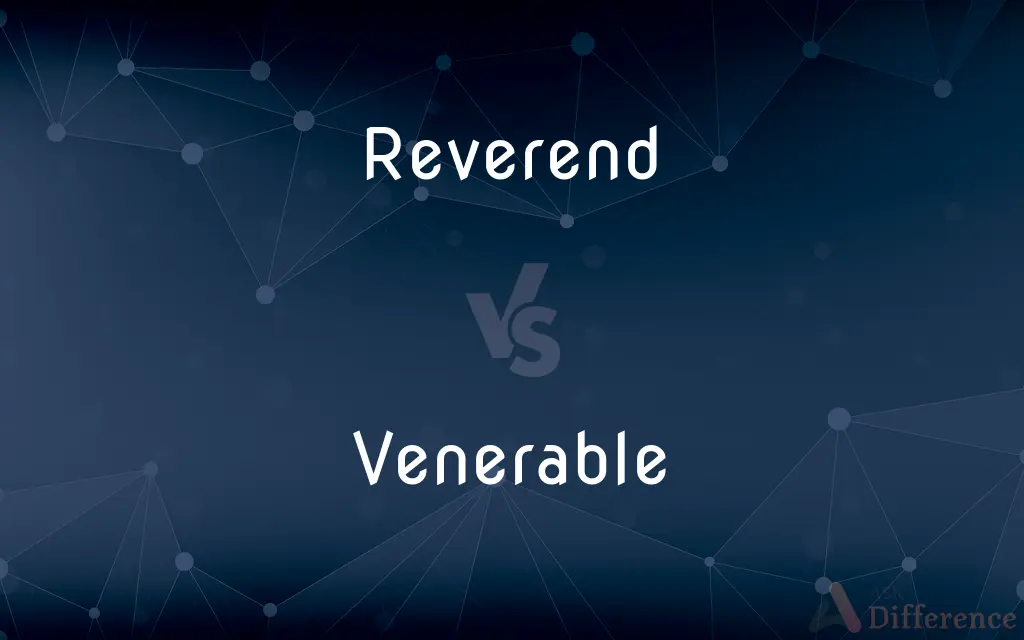Reverend vs. Venerable — What's the Difference?
By Tayyaba Rehman & Urooj Arif — Updated on April 16, 2024
Reverend is a title for Christian clergy, emphasizing respect, whereas Venerable is used for a person accorded a lot of respect in various contexts, often religious.

Difference Between Reverend and Venerable
Table of Contents
ADVERTISEMENT
Key Differences
Reverend is commonly used as a form of address for ministers in Christian denominations, indicating their role and authority within the church. On the other hand, Venerable is a title that can be applied to individuals in various religious and secular contexts to denote a high degree of respect due to their age, wisdom, or character.
In Christianity, the title "Reverend" can apply to a broad range of clergy, including pastors, priests, and ministers, reflecting their ordained status. Whereas, Venerable is specifically used within certain religious orders, like Buddhism and Christianity, to refer to those who have achieved a significant level of spiritual development or sanctity.
The usage of Reverend is relatively straightforward in the ecclesiastical hierarchy, often appearing before a cleric's name in written and spoken forms. On the other hand, Venerable is more selectively used and often denotes a formal recognition of holiness, especially in contexts like the beatification process in the Catholic Church.
The title Reverend may be modified with prefixes such as "Very" and "Right" to indicate different ranks or honors within church hierarchies. Conversely, Venerable stands alone or is followed by the person's name, without such hierarchical distinctions.
When addressing or referring to someone as Reverend, it typically pertains to their current active duties in ministry. Whereas Venerable often applies posthumously or after an individual has retired, recognizing their lifelong contributions or virtues.
ADVERTISEMENT
Comparison Chart
Context
Primarily Christian clergy
Various religious and secular, often religious
Implication
Clerical authority, respect
Great respect, often for moral or spiritual life
Usage Frequency
Common in everyday religious contexts
Less common, used in formal or specific contexts
Hierarchical Prefixes
Often used with prefixes like "Very," "Right"
Typically used alone or with name only
Typical Application
Used for active clergy members
Used for both living and posthumous recognition
Compare with Definitions
Reverend
A title used before the name of Christian clergy.
Reverend John Smith will lead today’s service.
Venerable
A title of deep respect for someone’s age, wisdom, or virtue.
The Venerable monk shared his wisdom.
Reverend
Associated with those ordained to the ministry.
She became a Reverend last year.
Venerable
Often indicates a status towards possible sainthood.
Her life’s work made her a Venerable in the community's eyes.
Reverend
Used to signify the respect for someone's spiritual duties.
The community holds the Reverend in high esteem.
Venerable
In Christian context, refers to someone recognized for their holiness.
The Venerable Bede is a noted historical figure.
Reverend
Denotes a person authorized to lead religious worship.
The Reverend performed the wedding ceremony.
Venerable
Used in formal recognition in religious orders.
He was declared Venerable by the church authorities.
Reverend
Often accompanied by additional honorifics to indicate rank.
The Very Reverend Dean is visiting us.
Venerable
Can be used in both secular and religious contexts.
The professor is considered venerable due to his contributions.
Reverend
Used as a title or form of address to members of the clergy
The Reverend Pat Tilly
Venerable
Commanding respect by virtue of age, dignity, character, or position.
Reverend
A member of the clergy
A retired reverend
Venerable
Worthy of reverence, especially by religious or historical association
Venerable relics.
Reverend
Deserving reverence.
Venerable
Roman Catholic Church Used as a title for a person who has reached the first stage of canonization.
Reverend
Relating to or characteristic of the clergy; clerical.
Venerable
Used as a form of address for an archdeacon in the Anglican Church or the Episcopal Church.
Reverend
Reverend Abbr. Rev. Used as a title and form of address for certain clerics in many Christian churches. In formal usage, preceded by the
The Reverend Jane Doe.
Reverend John Jones.
Venerable
Commanding respect because of age, dignity, character or position.
Reverend
A cleric or minister. Used with the.
Venerable
Worthy of reverence.
Reverend
Worthy of reverence or respect
Venerable
Ancient, antiquated or archaic.
Reverend
Reverent
Venerable
Made sacred especially by religious or historical association.
Reverend
(informal) A member of the Christian clergy; a minister.
Venerable
Giving an impression of aged goodness and benevolence.
Reverend
Worthy of reverence; entitled to respect mingled with fear and affection; venerable.
A reverend sire among them came.
They must give good example and reverend deportment in the face of their children.
Venerable
Capable of being venerated; worthy of veneration or reverence; deserving of honor and respect; - generally implying an advanced age; as, a venerable magistrate; a venerable parent.
He was a man of eternal self-sacrifice, and that is always venerable.
Venerable men! you have come down to us from a former generation.
Reverend
A member of the clergy and a spiritual leader of the Christian Church
Venerable
Rendered sacred by religious or other associations; that should be regarded with awe and treated with reverence; as, the venerable walls of a temple or a church.
Reverend
A title of respect for a clergyman
Venerable
Impressive by reason of age;
A venerable sage with white hair and beard
Reverend
Worthy of adoration or reverence
Venerable
Profoundly honored;
Revered holy men
Common Curiosities
Can a Reverend also be Venerable?
Yes, a Reverend can be called Venerable if recognized for their exceptional holiness or virtue.
What does it mean when someone is referred to as Venerable in Buddhism?
In Buddhism, Venerable is a respectful title for monks and nuns, acknowledging their spiritual commitment and wisdom.
What is a Reverend?
A Reverend is a title used before the name of a Christian clergy member authorized to perform religious duties.
Who can be called Venerable?
Venerable is a title given to individuals recognized for their holiness, wisdom, or moral virtue, often in a religious context.
Is the title Reverend used outside of Christian contexts?
No, Reverend is specifically used within Christian religious settings.
What is required to be addressed as Reverend?
Generally, ordination within a Christian church is required to use the title Reverend.
How do the titles of Reverend and Venerable differ in their application?
Reverend is generally used for active clergy in Christian contexts, while Venerable can denote respect for a person's lifelong virtues or spiritual achievements in both living and posthumous contexts.
Can anyone become a Venerable?
Typically, becoming Venerable requires formal recognition by a religious community or authority, often based on the individual’s virtuous life or spiritual contributions.
How is the title Venerable awarded in the Catholic Church?
In the Catholic Church, Venerable is a formal status awarded as part of the canonization process, recognizing a deceased person's life of heroic virtue.
Can Venerable be used as a standalone title?
Yes, Venerable is often used as a standalone title or directly followed by the person’s name without additional prefixes.
What distinguishes a Very Reverend from a Reverend?
"Very Reverend" is a specific honorific used for certain high-ranking clergy, such as deans or archpriests, indicating a higher ecclesiastical role.
Are there different ranks within the title Reverend?
Yes, the title Reverend can be enhanced with prefixes such as "Very" or "Right" to denote higher ranks or specific roles within the church hierarchy.
Is the title Venerable ever used in non-religious contexts?
Occasionally, Venerable can be used in secular contexts to express deep respect for someone’s age, experience, or contributions to society.
Is Venerable a permanent title?
Yes, once bestowed, the title Venerable is a lifelong and often posthumous recognition.
Does the title Reverend carry legal implications?
In some regions, holding the title Reverend may involve certain legal roles or capabilities, especially in performing marriages or other sacraments.
Share Your Discovery

Previous Comparison
Drama vs. Fabrication
Next Comparison
Planning vs. SchedulingAuthor Spotlight
Written by
Tayyaba RehmanTayyaba Rehman is a distinguished writer, currently serving as a primary contributor to askdifference.com. As a researcher in semantics and etymology, Tayyaba's passion for the complexity of languages and their distinctions has found a perfect home on the platform. Tayyaba delves into the intricacies of language, distinguishing between commonly confused words and phrases, thereby providing clarity for readers worldwide.
Co-written by
Urooj ArifUrooj is a skilled content writer at Ask Difference, known for her exceptional ability to simplify complex topics into engaging and informative content. With a passion for research and a flair for clear, concise writing, she consistently delivers articles that resonate with our diverse audience.
















































